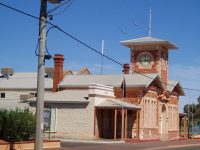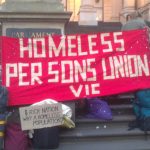Man Fights to Live on His Own Property

As Australia grapples with a growing homelessness problem, a man in WA is fighting for the right to live on his own property.
In a case currently before the courts in Western Australia, a 58-year old self-described ‘introvert’ and ‘nomad’ is fighting his local council for the right to live on his own land.
The case so far
Roland Gopel is being penalised $50 for each day he lives in a caravan on his own property.
The land is a classic Aussie quarter-acre block, but it’s not in suburbia and isn’t formally authorised for a residence. It’s in scrubland on a hilltop overlooking a small town called Menzies, about 730 kilometres north-east of Perth. Once a thriving gold mining town, Menzies now has a population of about 250 people, a town hall (pictured) and of course a pub.
Living on his block of land on the outskirts, Mr Gopel has no sewerage, but has a rainwater tank that collects water for drinking and showering.
He lives in a caravan, but is now facing eviction for what the local council says is ‘camping illegally’.
In August this year, the land owner was fined $1,000 plus court costs of $1,745.50 for his ‘illegal’ conduct. The council also began to charge him a $50 per day penalty.
The fine has now grown to $4,750 in the three months since his last court appearance.
Your home may not be your castle
The local council won’t comment on the case, given it is still before the courts – Mr Gopel is due to appear again later this month. But the story has sparked debate across the country.
According to legislation and bylaws, the idea you can buy land and ‘do as you please’ is a misguided one. Councils, State Governments and even the Federal Government have a long list of rules and regulations that they contend need to be followed.
Mr Gopel says he has nowhere left to go if he is forced off his own land. He moved to the small town two years ago after being unable to afford rent in Perth.
He is currently applying for a disability pension. He says he pays his rates, despite having no council services, and that it’s highly unlikely he’ll be able to afford the fines and legal costs as they continue to mount. He is considering applying for legal aid to work his way through the legal nightmare. He fears soon becoming homeless.
Western Australian advocacy group Homeless Connect says that on any given night, there are more than 13,000 people homeless in Western Australia.
And it’s not an isolated problem. Homelessness is endemic right across Australia.
New South Wales
Last month, Australian Greens Senator Lee Rhiannon posted statistics that over 28,000 people are homeless in New South Wales. According to the figures, 68,000 properties sit vacant in this state – either not lived in or used as holiday rental properties.
Yet we have known for some time that in this country there is a housing affordability problem– not just in the major capital cities.
In NSW alone, there are approximately 60,000 people on the public housing waiting list, and experts working in social services say government policy goes nowhere near addressing the shortages. In Australia, social housing only accounts for 4 percent of the overall housing stock.
In the meantime, those who find themselves without suitable accommodation are increasingly penalised.
The NSW Government created new laws this year to broaden police powers to remove people and their property from crown land within the City of Sydney local area. The law specifically targeted a camp of rough sleepers in Martin Place. It did nothing to solve the plight of these people, except to place more undue stress on already stretched crisis services.
In other states
In Victoria too, homeless people are now at the mercy of new bylaws which ban rough sleeping in the Melbourne City centre. Under the laws, ‘rough sleepers’ can be fined $250.
South Australia, on the other hand, is looking to other countries to help solve its increasing homeless problem, initiating a project called Adelaide Zero which is based on a US model which aims to eradicate homelessness.
Innovative solutions are also being implemented in Europe, which Australia could well emulate.
Tax breaks for the rich
As the gap widens between the ‘haves’ and ‘have nots’, many feel we need to implement laws dissuading investors from purchasing multiple properties which sit vacant on speculation that prices will continue rising. They feel tax breaks for investment properties, such as negative gearing, have merely added to the affordability crisis.
After all, it’s hard to call Australia ‘the lucky country’ when so many can’t even afford a roof over their heads.







